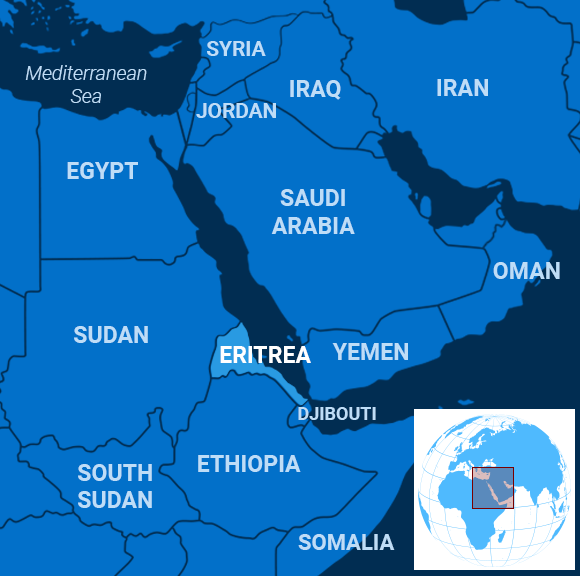ERITREA

We Don’t Need No Education
Every Eritrean high school student spends the 12th grade at the Warsai Yikealo Secondary School and Vocational Training Center near the border with Sudan.
The students quickly realize that reading and arithmetic are not uppermost in their masters’ minds.
“From the first month, the alarm rings at 5 a.m.,” a former studenttold Human Rights Watch. “They make you run to the toilet, you (have) five minutes to wash — if we had water, which wasn’t always the case — five minutes to put your uniform on. You get punished if you don’t manage. We would have military training until 8 a.m. The military trainer is always with you; he stays in the dorm. The (physical) punishments were so hard; I was desperate to escape them and so I would try to stick to the rules.”
As the Mail & Guardian explained, the school and training center are located within the Sawa military base. A photograph in the South African newspaper showed a graduating class of students dressed in fatigues, sporting different colored berets and marching like soldiers on parade.
The school-cum-compulsory basic training is an example of how Eritrea is one of the most repressive regimes in the world under former freedom fighter and current President Isaias Afwerki,argued the Globe Post. After they graduate, many students will be assigned to the military or other jobs as part of their “national service,” an indefinite period of time when their life aspirations are put on hold.
Neither the people nor their legislators have ever ratified an Eritrean constitution. Parliament was discontinued years ago. The ruling party, which happens to be the only legal political party in the country, the People’s Front for Democracy and Justice, hasn’t held a convention in years. No independent media outlets exist. International news organizations are banned from stationing journalists in the country permanently.
Quartz wrote about how especially the young have been fleeing the country in order to avoid national service. One would think Afwerki would make changes in order to avoid such an exodus, but his aidestold Reuters they needed to build up Eritrean forces to defend against foes like Ethiopia. The two countries fought a war between 1998 and 2000 that only officially ended in 2018.
Eritreans in the US and Europe have launched social media campaigns calling for Afwerki’s ouster, the BBC reported. A regional specialist, Valerie Frank, wrote in African Arguments that the president’s grip on power is only tightening.
Some have openly wondered whether the president might want to ask himself if it’s wise to fill an army that keeps him in power with people who don’t want to serve.
No comments:
Post a Comment